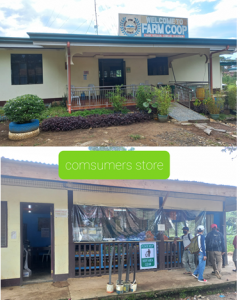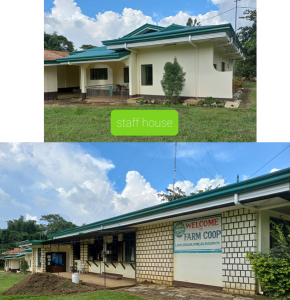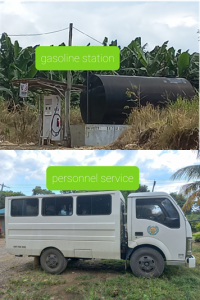 On September 30, 1990, San Miguel Corporation (SMC) divested its coffee operations. Consequently, it resulted in the complete displacement of the 430 regular farm employees and workers living around the plantation in Sumilao, Bukidnon. Together with the plan to divest the coffee operation was to turn over and donate the productive SMC assets through the government’s agrarian reform program to its regular employees including the standing crop of 1,100 hectares of coffee by a Deed of Transfer and the transfer of rights of the leased area owned by various land covered by the Deed of Assignment documents.
On September 30, 1990, San Miguel Corporation (SMC) divested its coffee operations. Consequently, it resulted in the complete displacement of the 430 regular farm employees and workers living around the plantation in Sumilao, Bukidnon. Together with the plan to divest the coffee operation was to turn over and donate the productive SMC assets through the government’s agrarian reform program to its regular employees including the standing crop of 1,100 hectares of coffee by a Deed of Transfer and the transfer of rights of the leased area owned by various land covered by the Deed of Assignment documents.
The First Agrarian Reform MPC (FARMCOOP) was formed on October 20, 1990, and formally registered on November 2, 1990, under Cooperative Development Authority (CDA) with the Certificate of Registration No. OC- 032 as a primary multi-purpose cooperative with the assistance of the PHILIPPINE BUSINESS FOR SOCIAL PROGRESS (PBSP). The earliest training programs were designed and conducted to develop the capabilities of the employee-beneficiaries to effectively own and manage their farm enterprise. FARMCOOP was also supported by local and national government organizations, NGO’s and other line agencies.
FARMCOOP, at the beginning of its operation, maintained about 1,100 hectares of coffee plantation mainly for producing robusta variety. By 1998, the cooperative converted about 204 hectares of its coffee plantation for a particular banana plantation project under a special contract with Dole Philippines, Inc. STANFILCO Division – North Skyland Zone. Under the terms of the agreement with North Skyland, the cooperative will handle the production and operation of the plantation while North Skyland will provide for the technical personnel to oversee the farm operations. FARMCOOP was assured of a guaranteed income for the use of the land. Also, production bonuses based on determined measurable performance and a subsidy for administrative and engineering expenses were part of the agreement.
 FARMCOOP organized its Management Team to oversee its day-to-day business operations. Most of what makes a worker co-op successful is the strength of the members, to know what customers want, when, and how. Additionally, constant monitoring of finances (CASH FLOW & BALANCE SHEET), management experience, ability to adapt and evolve, transparency within the team, firm decision-making, and great accountability systems are also factors to become a successful cooperative.
FARMCOOP organized its Management Team to oversee its day-to-day business operations. Most of what makes a worker co-op successful is the strength of the members, to know what customers want, when, and how. Additionally, constant monitoring of finances (CASH FLOW & BALANCE SHEET), management experience, ability to adapt and evolve, transparency within the team, firm decision-making, and great accountability systems are also factors to become a successful cooperative.
All and these factors mainly contributed to the success of any business. As applied in FARMCOOP, the latter identified the current demand for the product, planning has to be thorough and realistic, and the enterprise has to make money. The members and associates of FARMCOOP are entitled to receive patronages and dividends if they have Capital Build-Up (CBU) distributed from the net surplus and determined by the amount the members and associates spent on their products taken from the prior year payout.
The FARMCOOP agreed with DOLE Philippines, Inc., to supply all the farm inputs/ materials and to oversee the technology to be adopted and the marketing of the fruits. On the other hand, FARMCOOP will manage and supervise the plantation areas to supply the labor required in the farm being an Agrarian Reform Beneficiary. The partnership agreement also includes Dole Philippines, Inc., to buy out the FARMCOOP’s loan obligation with Landbank amounting to 13 Million Pesos. FARMCOOP will then pay on a staggard basis from the guaranteed minimum profit of the initial 198.0 hectares to be planted with bananas without interest. From that time on, FARMCOOP started to increase its assets, and the remaining 202 members- ARB’s who were still qualified to work were employed. The qualified dependents and relatives of the members were also hired in the banana operation and in the support services section- engineering/ motor pool, hauling, consumer store, piggery operation, manpower services, financial services, office, and clerical works. Dole Philippines, Inc. also agreed to cater their hauling services with FARMCOOP – hauling seedlings materials from their nursery, other materials for the fruit care maintenance and manufacturing, fertilizers, and chemicals, including ferrying of workers/ laborers giving priority to the Coop Areas. The cooperative now owns various elf trucks, Bongo fruit haulers, light vehicles and motorcycles, farm tractors, and four (4) units tractor heads to haul the cooperative’s boxed bananas from the farm to Dole Panabo Wharf in Panabo City, Davao del Norte.
 The Dole Philippines, Inc., also rented the 70.0 hectares of land areas of FARMCOOP in Casisang- Imbayao, Malaybalay City and they (Dole Philippines, Inc.,) managed the said banana plantation. Effective 2019, Dole Philippines, Inc., approved the land rental rate or the guaranteed minimum profit to P25,000.00 per hectare per year from P18,250.00. FARMCOOP also agreed that if their farm can get 3,000 boxes class- A per hectare per year, the cooperative will receive an equivalent of $0.08 per box as a production incentive. Another reason for the success of the cooperative is the undying support of the Board of Directors together with the management team, and ARB’s members. They bring FARMCOOP’s employees together, encourage them to use their diverse skills and talents, and provide them with an opportunity to develop the employee’s capabilities.
The Dole Philippines, Inc., also rented the 70.0 hectares of land areas of FARMCOOP in Casisang- Imbayao, Malaybalay City and they (Dole Philippines, Inc.,) managed the said banana plantation. Effective 2019, Dole Philippines, Inc., approved the land rental rate or the guaranteed minimum profit to P25,000.00 per hectare per year from P18,250.00. FARMCOOP also agreed that if their farm can get 3,000 boxes class- A per hectare per year, the cooperative will receive an equivalent of $0.08 per box as a production incentive. Another reason for the success of the cooperative is the undying support of the Board of Directors together with the management team, and ARB’s members. They bring FARMCOOP’s employees together, encourage them to use their diverse skills and talents, and provide them with an opportunity to develop the employee’s capabilities.
At present FARMCOOP has 202 active members and extended the membership to their dependents (wife and sons/ daughters of the original members) composing 404 associate members. From an experimental venture in 1998, FARMCOOP had engaged in corn production of 45.0 hectares, hauling and corn drying services, consumers’ stores, and credit operations catering mainly to members and employees.






